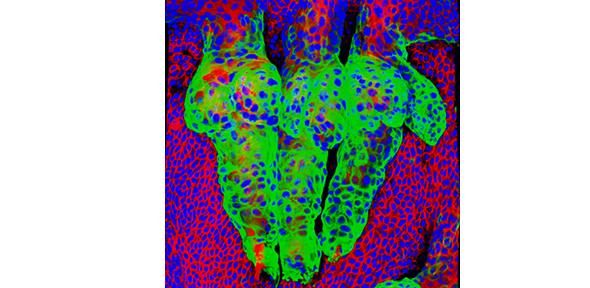
Image shows a triplet of oesophageal-derived hair follicles, stained for the hair follicle marker KRT24 (green). Credit: Paula Jimenez-Gomez
The final intake for this programme concluded in 2024. This programme will not be running from Oct 2025 onwards.
Funded by Wellcome, this 4-year MRes + PhD programme provides students with an opportunity to spend time in three different labs during their first 'rotation' year, before making a decision about where they would like to undertake their PhD in years 2-4. The programme is suited to students who have not decided on a specific supervisor and/or do not have their own funding. The programme combines scientific excellence with a commitment to improving the working environment and transition support for trainees. We commit to being part of an evolving community of practitioners who will develop and share practice to bring science and culture together, placing both firmly at the heart of what we do.
Further course information: https://www.postgraduate.study.cam.ac.uk/courses/directory/blscpdscb
Course outline
Year one
Our objective is to use the opportunity provided by Wellcome to provide a multi-faceted course that gives students a comprehensive preparation for their PhD research. There are four main components to the first year:
1. Lab Rotations
Each student will rotate in the laboratories of 3 different contributing supervisors. Rotations should be selected so that the student gains experience of at least two different stem cell systems. Each rotation will last for 9 weeks, with 3 additional weeks at the end for data analysis and a project report write-up. These rotations expose the students to different techniques, organisms and areas of research in stem cell biology in Cambridge, and allow them to make an informed decision at the end of the first year, which laboratory they wish to join to carry out their main thesis research for years 2-4.
2. Stem Cell Discussion Course
The purpose of the stem cell core discussion course is to provide students with a critical understanding of the major topics in Stem Cell Biology. Each module will focus on a particular topic. Term 1 sessions involve introductory talks from each of our current research group leaders. Term 2 and 3 sessions will revolve around the discussion of 2-3 research papers which students are expected to read ahead of each session. All first-year students / clinical fellow students at the Stem Cell Institute have the opportunity to participate in this course. View an example Core Stem Cell Course schedule.
3. Researcher Development Training
Researcher Development encompasses all the learning and development that you might wish to experience and acquire during your time at Cambridge. It provides you with skills you need to progress through your MRes and PhD, as well for your future. The Researcher Development team provides a diverse programme of activities and online resources for PhD students, as well as acting as a hub for the coordination of Researcher Development provision in the University. For more information, please visit the Researcher Development website.
4. Research Project Proposal
Students are expected to choose a laboratory for their thesis research towards the end of their first year. They will write a PhD Research Proposal which will form part of the assessment for a Masters (MRes) Degree in Stem Cell Biology. Students will normally then commence a 3-Year PhD.
Years 2-4: The Research Project
The PhD research project will occupy years 2-4 and will constitute the main research component of the course.
All students at the Stem Cell Institute are expected to participate in the annual 'PhD Symposium', which will involve either presenting a talk or a poster (depending on which study year you are in).
Students on the Four-Year Stem Cell Biology Programme will also take part in an annual 'Presentation Day' where they will present their current research to, and receive feedback from, the CSCI Postgraduate Student Committee.
Students at the CSCI will become members of the Postgraduate School of the Life Sciences, which organises and promotes many further training opportunities.


